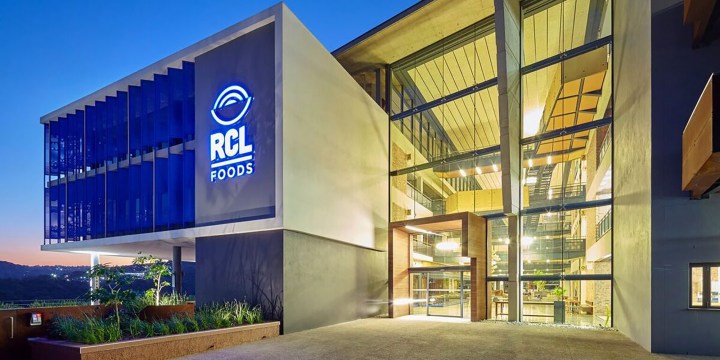COMPANY RESULTS
Blackouts and high commodity input costs are biting into RCL’s profits

RCL Foods, which owns the Yum Yum peanut butter, Ultra Pet, Rainbow Chicken and Selati sugar brands, says margins and volumes are under pressure due to persistently high agricultural commodity input costs and record levels of rolling blackouts, which have hurt production, added R96.6m in direct costs and eaten into profits.
RCL Foods has also taken a pounding from industrial action in its groceries and baking business units, which was resolved, it said, “with due concern for employees’ welfare as consumers and a desire to limit potential food price increases”.
With the Rainbow and Vector Logistics separation processes still in progress, RCL’s directors resolved not to declare an interim dividend to preserve cash while the group repositions its portfolio.
The consumer goods and milling company released its interim results on Monday, for the six months ended 31 December 2022.
Ebitda (earnings before interest, taxes, depreciation, amortisation and impairments) was down 8.9% to R1.18-billion due to “exceptionally difficult trading conditions marked by high input costs, rising living costs for consumers and significant load shedding”.
Still, it believes its results are resilient as revenue for the period under review had increased by 17.6% to R20.2-billion compared with the prior period, driven by higher pricing to offset those rising input costs, and higher volumes in its sugar, Rainbow and Vector Logistics divisions.
“Focusing on the factors we can control in current conditions, we have sought to deliver a stable rand profit and grow market share while supporting cash-strapped consumers as far as possible, both through value innovations and responsibly managed price increases.
“In so doing, our concern has been to balance the need for margin protection with the pressure on consumers’ pockets,” said group chief executive Paul Cruickshank.
The underlying results exclude material once-offs and accounting adjustments in the current and prior period, as well as the direct cost impact of the July 2021 civil unrest and the fire at RCL’s sugar mill in Komatipoort, Mpumalanga, in October 2021. At least 41,000 tonnes of sugar were destroyed in the blaze. There were no injuries. An RCL spokesperson said they suffered a R25.4-million net loss from the fire damage. The company plans to reopen the mill.
“Whilst the fire at the Komatipoort site in October 2021 caused significant damage to the raw sugar warehouse, supply chain disruption was minimised. Insurance proceeds will fully cover the rebuild costs in the 2023 financial year.”
On 5 September last year, the group noted in its results announcement that RCL Foods was on a journey to create a “profitable, sustainable value-added branded business of scale”.
Visit Daily Maverick’s home page for more news, analysis and investigations
It said it planned to separate its value-added branded business from its poultry, sugar and logistics businesses to position the latter for optimal growth as independent entities; and to scale its value-added component through a sharper strategic focus and active investment.
An extensive process has been followed to establish Rainbow (chicken and grain-based animal feed) as a stand-alone entity, which included creating a separate legal entity for Rainbow; exiting the RCL Foods shared services platform as dedicated Rainbow teams are progressively established; and devising an execution plan for the final separation phase.
While Rainbow continues to share certain Group platform services, the business is now operating as an autonomous subsidiary of RCL Foods.
It is also committed to the process of separating Vector Logistics from RCL Foods. An RCL spokesperson said the manufacturer had lined up a potential acquirer for the Vector Logistics business and that negotiations were in an advanced stage.
RCL finalised the acquisition of Sunshine Bakery in February 2023, effective 1 March 2023, to expand its baking business into KwaZulu-Natal.
The value-added business (groceries, baking and sugar business units) delivered a resilient set of results, growing its market share in several categories amid a decline in total market sales volumes. Revenue increased 16.7% to R12.24-billion, with volumes declining across most operations due to higher pricing and production challenges.
Blackouts and strikes at its grocery and pies facilities were also difficult. It said its baking business unit was affected by a slowdown in demand due to price increases it was forced to introduce to counter high wheat and maize prices.
The sugar business unit produced good results, driven by an increase in local market sales volumes.
Rainbow saw a 19.2% revenue increase to R6.58-billion, driven by higher volumes, pricing and an improved mix. But ebitda declined 110.5% because of high commodity input costs, poor agricultural performance and the impact of blackouts.
Vector Logistics’ revenue increased by 17.2% to R2.144-billion with food service volumes exceeding pre-Covid levels. Here again, ebitda of R165.6-million was down 9.1% because of cost pressures arising from blackouts, electricity price hikes and higher fuel and insurance costs.
RCL says that with little relief in sight from a commodity pricing perspective, consumer demand is expected to remain muted.
The Tongaat Hulett Limited business rescue process also poses a potential threat to the sugar industry.
Rainbow expects improved agricultural results in the coming financial year and remains confident of delivering on its turnaround plan. The impact of blackouts on suppliers is expected to hurt volumes throughout the Vector Logistics network.
Food producer inflation rose to 14.6% in January from 13.6% in December. Last week, the SA Poultry Association said producers needed to look beyond the country’s borders to offset economic pressures at home, where domestic consumers were under increasing strain, because power outages had increased the cost of producing birds, and the industry had done all it could to mitigate against the consequences.
Therefore, consumers must expect to pay more for poultry products. BM/DM

















Comments - Please login in order to comment.